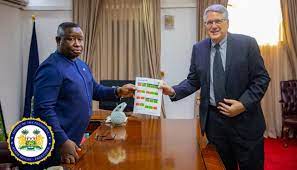By Hassan Osman Kargbo
In a significant leap toward energy independence, Sierra Leone has been named among the first two African countries selected to benefit from Mission 300, a bold, continent-wide initiative aimed at expanding electricity access to 300 million people by 2030.
The announcement comes as a testament to the visionary leadership of President Julius Maada Bio, whose administration has prioritized energy reform, climate resilience, and renewable energy innovation through the Presidential Initiative on Climate Change, Renewable Energy, and Food Security (PI-CREF). In a region where nearly 600 million people still live in darkness, this milestone marks Sierra Leone’s transformation from a passive recipient of aid to a continental model of energy leadership.
Mission 300 is a collaborative effort spearheaded by the World Bank and the African Development Bank, supported by strategic partners across the public and private sectors. The program blends major infrastructure investments with systemic policy reforms, aiming not only to deliver electricity but to lay the foundation for long-term energy sustainability.
Speaking during the recent energy summit that unveiled the initiative, development partners emphasized the need for African governments to lead from the front—something Sierra Leone has exemplified. “President Bio’s government is not just committed; they are prepared,” one World Bank official noted. “Sierra Leone’s groundwork through MCC and PI-CREF positioned them to hit the ground running.”
While some may have viewed Sierra Leone’s recent exit from the Millennium Challenge Corporation (MCC) Compact as a setback, the legacy of that partnership has, in fact, been foundational. The comprehensive energy diagnostics conducted under MCC now serve as a blueprint for the nation’s Energy Transition and Green Growth Plan, studies that outlined Sierra Leone’s untapped potential in renewable energy, as well as the structural and institutional reforms needed to unlock such.
“The MCC door may have closed,” a State House official commented, “but a much bigger one has opened—and Sierra Leone is ready.”
PI-CREF’s partnerships with global clean energy leaders such as the International Renewable Energy Agency (IRENA) and Sustainable Energy for All (SEforALL) have bolstered Sierra Leone’s credibility as a serious player in climate and energy reform, alliances that have helped build a pipeline of viable clean energy projects, ready for financing and implementation under Mission 300.
Importantly, Mission 300 is not just about hardware—solar panels and power grids—but also about governance. It demands political buy-in at the highest levels, clarity in regulation, and transparency in public-private engagements. Sierra Leone’s inclusion as a frontrunner suggests that it has demonstrated both the technical readiness and the political will.
For President Bio, this is not just a technical achievement—it is a legacy-defining moment. “We must stop waiting for ‘manna’ from a heaven we have imagined in our minds,” he recently stated. “We have what it takes to feed ourselves, power ourselves, and govern ourselves with pride.”
As the country prepares to roll out the first phase of Mission 300, attention now turns to implementation. The stakes are high, but the opportunity is historic. If successful, Sierra Leone could become a regional benchmark—lighting up homes, fueling industries, and inspiring a new model of African-led development.












